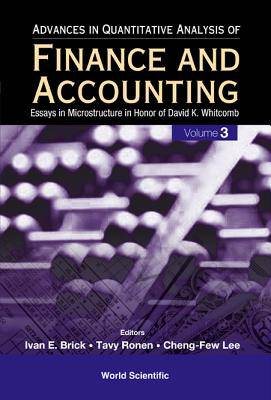
- Retrait gratuit dans votre magasin Club
- 7.000.000 titres dans notre catalogue
- Payer en toute sécurité
- Toujours un magasin près de chez vous
- Retrait gratuit dans votre magasin Club
- 7.000.0000 titres dans notre catalogue
- Payer en toute sécurité
- Toujours un magasin près de chez vous
Advances in Quantitative Analysis of Finance and Accounting (Vol. 3): Essays in Microstructure in Honor of David K Whitcomb
182,95 €
+ 365 points
Description
News
Professor Cheng-Few Lee ranks #1 based on his publications in the 26 core finance journals, and #163 based on publications in the 7 leading finance journals (Source: Most Prolific Authors in the Finance Literature: 1959-2008 by Jean L Heck and Philip L Cooley (Saint Joseph's University and Trinity University).
Market microstructure is the study of how markets operate and how transaction dynamics can affect security price formation and behavior. The impact of microstructure on all areas of finance has been increasingly apparent. Empirical microstructure has opened the door for improved transaction cost measurement, volatility dynamics and even asymmetric information measures, among others. Thus, this field is an important building block towards understanding today's financial markets. One of the pioneers in the field of market microstructure is David K Whitcomb, who retired from Rutgers University in 1999 after 25 years of service. David generously funded the David K Whitcomb Center for Research in Financial Services, located at Rutgers University. The Center organized a conference at Rutgers in his honor. This conference showcased papers and research conducted by the leading luminaries in the field of microstructure and drew a broad and illustrious audience of academicians, practitioners and former students, all who came to pay tribute to David K Whitcomb. Most of the papers in this volume were presented at that conference and the contributions to this volume are a lasting bookmark in microstructure. The coverage of topics on this volume is broad, ranging from the theoretical to empirical, and covering various issues from market architecture to liquidity and volatility.
Professor Cheng-Few Lee ranks #1 based on his publications in the 26 core finance journals, and #163 based on publications in the 7 leading finance journals (Source: Most Prolific Authors in the Finance Literature: 1959-2008 by Jean L Heck and Philip L Cooley (Saint Joseph's University and Trinity University).
Market microstructure is the study of how markets operate and how transaction dynamics can affect security price formation and behavior. The impact of microstructure on all areas of finance has been increasingly apparent. Empirical microstructure has opened the door for improved transaction cost measurement, volatility dynamics and even asymmetric information measures, among others. Thus, this field is an important building block towards understanding today's financial markets. One of the pioneers in the field of market microstructure is David K Whitcomb, who retired from Rutgers University in 1999 after 25 years of service. David generously funded the David K Whitcomb Center for Research in Financial Services, located at Rutgers University. The Center organized a conference at Rutgers in his honor. This conference showcased papers and research conducted by the leading luminaries in the field of microstructure and drew a broad and illustrious audience of academicians, practitioners and former students, all who came to pay tribute to David K Whitcomb. Most of the papers in this volume were presented at that conference and the contributions to this volume are a lasting bookmark in microstructure. The coverage of topics on this volume is broad, ranging from the theoretical to empirical, and covering various issues from market architecture to liquidity and volatility.
Spécifications
Parties prenantes
- Editeur:
Contenu
- Nombre de pages :
- 268
- Langue:
- Anglais
- Collection :
- Tome:
- n° 3
Caractéristiques
- EAN:
- 9789812566263
- Date de parution :
- 01-06-06
- Format:
- Livre relié
- Format numérique:
- Genaaid
- Dimensions :
- 155 mm x 235 mm
- Poids :
- 530 g

Les avis
Nous publions uniquement les avis qui respectent les conditions requises. Consultez nos conditions pour les avis.





